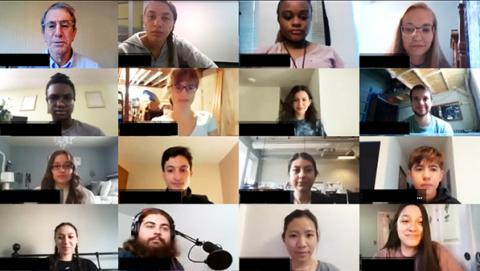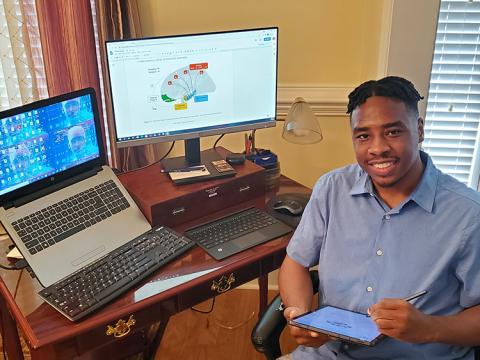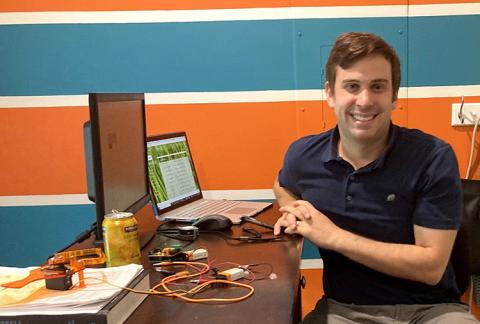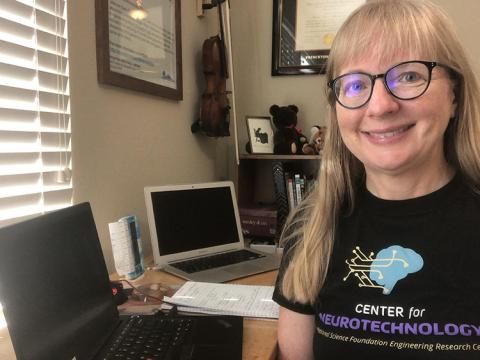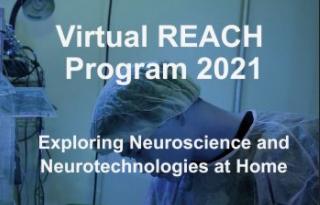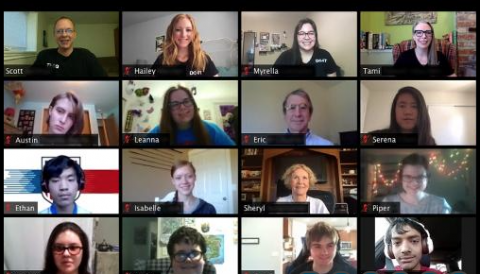Last year, some summer programs at the Center for Neurotechnology were cancelled because of health concerns surrounding COVID-19; however, the Center’s education staff remained undaunted. They reimagined and reshaped curricula so that almost all CNT summer programs could be offered this year by providing an online, virtual learning experience for participants. The move to remote learning, forced by the pandemic, also had an unexpected benefit. It allowed the CNT to expand its education programs to a wider audience.
“After the cancellation of summer undergraduate programs in 2020 due to the COVID-19 pandemic, the CNT summer Research Experience for Undergraduates program is back this year. Because of continued health and safety precautions, the program is being held online, but students are still fully engaged in research,” said CNT Executive and Education Director Eric Chudler. “Similarly, the Center’s YSP-REACH program will be hosted online. About 80 high school students will participate in the YSP-REACH program this summer, which is our largest cohort for the program to date.”
This year, summer program participation is as robust as it ever has been and includes participants not only locally and regionally, but nationally and internationally as well. Some programs are even seeing participants return from prior years to renew and enhance their experience or to assist with classes, workshops and presentations.
Below is an overview of this year’s CNT summer programs. More information about the Center’s education programs is available on the CNT website.
Research Experience for Undergraduates
The Research Experience for Undergraduates is a 10-week summer program that is traditionally held on the University of Washington Seattle campus. The program provides undergraduate students with opportunities to work on research projects with CNT members and to take part in workshop training sessions in ethics, communications and scientific presentation skills designed to provide the undergraduate scientist with a solid foundation for graduate study.
“As an undergraduate hoping to pursue a career in neural network research, I knew that researching human-machine interaction would be a great step forward,” said Alexis Blakes, an REU participant from Columbia Basin College, who is working virtually with Sam Burden in the UW Department of Electrical & Computer Engineering.
This year, the REU program takes place from June 15 to August 20, and it has 13 participants from higher education institutions across the country, including Kansas State University, Wake Forest University, Tufts University and the Georgia Institute of Technology. The cohort is also one of the most diverse the program has ever had, with 62% of REU participants coming from underrepresented minority groups.
“The Center for Neurotechnology exposes students to a variety of different sub-fields in neuroscience,” said Joseph Walker, an REU participant from Morehouse College who is taking part in research at the Stocco lab. “This REU also gives future neuroscientists, like myself, an opportunity to research some of the questions found in the intersection between biomedical and computer sciences.”
In addition to mentorship received in the lab, REU participants have the opportunity to learn from and interact with students taking part in other UW summer research programs. For example, during the program’s weekly communications class, the 13 REU students are joined with 16 undergraduate students from the UW-ENDURE program, the UW Institute for Stem Cell and Regenerative Medicine program, and the Weill Neurohub.
Research Experience for Teachers
The Research Experience for Teachers is a summer research program for middle and high school teachers, traditionally held on the University of Washington Seattle campus. Teachers selected for the program participate in ongoing research projects with CNT members and have the opportunity to develop new classroom lesson plans based on their research experience.
The RET program is running from June 21 to July 30 this summer, and it has five high school teacher participants. Three teachers are local to the Greater Puget Sound region and two are from out of state. Also, one participant from a prior year has returned to the program, which is not uncommon among RET participants.
“I have had a tremendous experience this summer. During the school year, students view me as the expert. The program has allowed me to switch roles and learn from dedicated researchers,” said RET participant Benjamin Hart, who teaches at Redmond High School in Redmond, Washington. “The RET experience has also provided me the opportunity to learn more about the process of writing standards-based curriculum. My curriculum centers on an activity with a robotic claw from Backyard Brains that uses electromyography. I can’t wait to explore ‘The Claw’ with my students next year!”
“This year, Benjamin is returning for his second year of the Research Experience for Teachers program,” said CNT Engineering Education Research Manager Kristen Bergsman. “He originally completed his first year in the program in 2015. Both in 2015 and now in 2021, he has worked in CNT Co-Director Chet Moritz’ lab. Between 2015 and now, Benjamin maintained a relationship with Chet, which included inviting him as a guest speaker each year to present to Benjamin’s Biology Club.”
The RET program has been overseen by Bergsman for eight years, and this is her second summer running it in a virtual environment. She noted that because the program is offered online, she was able to open applications to teachers across the country, and as a result, the program received more applications than any other year in the past.
YSP-REACH
The Center’s Young Scholars Program-REACH is a five-day program for high school students that is normally held on the University of Washington campus each summer. Participants receive an introduction to neuroscience and neural engineering, neuroethics, scientific communication and the latest developments in brain-computer interfaces. The goal of the program is to provide students with exposure to the field of neural engineering and basic preparation for college studies in science, technology, engineering or math (STEM) as well as future STEM careers.
This year, the program will take place online the first week of August, and it has 84 participants. The majority of the students are from the Puget Sound area, but many are from outside Washington state. The program includes participants from Texas, California, Virginia, New Jersey, Wisconsin, Florida and Minnesota, as well as Japan and Macedonia.
Students will be using an online textbook, “Exploring Neuroscience and Neurotechnologies at Home,” which was authored by Bergsman and Chudler. The textbook was specifically designed, developed and published for students participating in the YSP-REACH program virtually in 2020 and 2021.
Neuroscience for Neurodiverse Learners
Neuroscience for Neurodiverse Learners is a year-round program and summer camp designed for students with academic challenges related to conditions such as dyslexia, attention deficit hyperactivity disorder and autism spectrum disorder. The program is run jointly by the CNT and the DO-IT Center at the University of Washington.
NNL provides neurodiverse high school students with resources and tools they will need to be successful in fields related to neuroscience. Students learn about STEM and receive mentorship aimed at helping them to develop their own talents and abilities, all in a remote learning environment.
“We have two returning campers from last year to act as camp mentors, and we will have mentoring sessions with more of last year’s campers as well as faculty and neuroscience students,” said CNT Associate Director of Diversity Scott Bellman, who is NNL project director.
Bellman said that he anticipates about 25 participants for this year’s NNL summer camp, which will run two weeks starting August 9.
Interested in learning more or participating in CNT summer programs? Visit the education pages on the CNT website or contact CNT Executive and Education Director Eric Chudler for more information.

